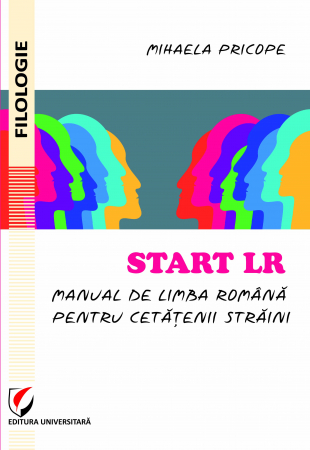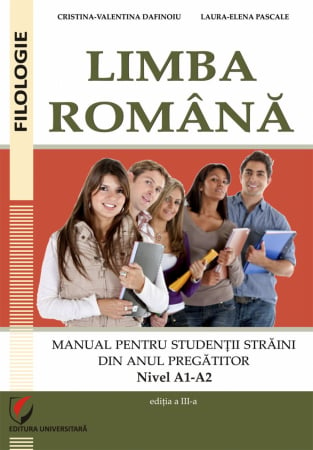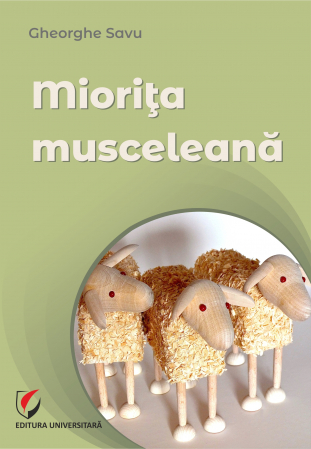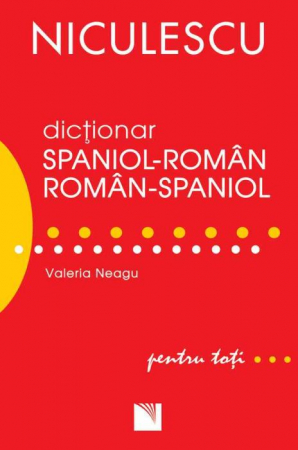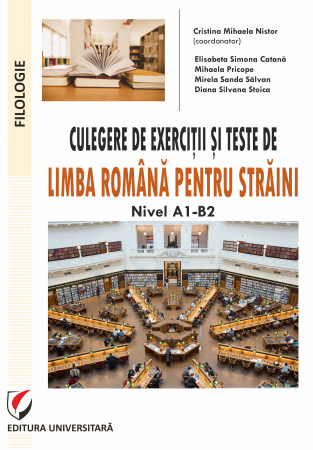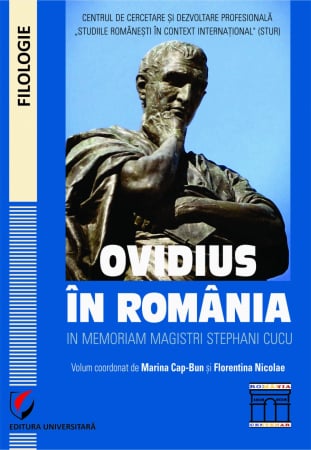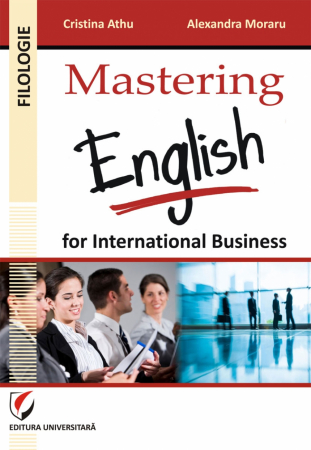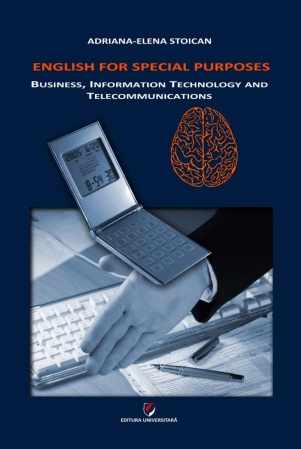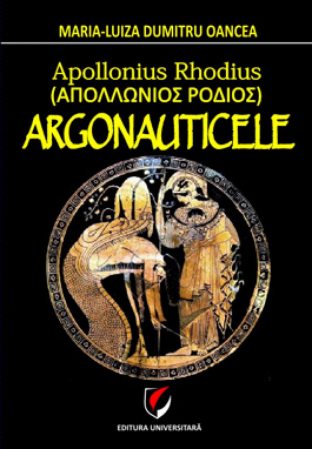Manuscript proposals: [email protected] / 0745 204 115 //// Tracking orders Individuals / Sales: 0745 200 357 / Orders Legal entities: 0721 722 783
ISBN: 978-606-28-1359-8
DOI: https://doi.org/10.5682/9786062813598
Publisher year: 2021
Edition: I
Pages: 126, 142
Publisher: Editura Universitară
Author: Silvia Osman
Product Code:
9786062813598
Do you need help?
0745 200 357
- Description
- Download (1)
- Authors
- Content
- More details
- Reviews (0)
In a world where everything (to us) happens with the speed of thought, and the results should appear immediately, if not yesterday, the practices of learning and teaching foreign languages must adapt and keep pace with the natural flow of things. The students of the 21st century are demanding and used to the fast pace of information that flows to them continuously from virtual environments and they need methods, tools and practices that facilitate their acquisition of a foreign language at the pace in (and with) that they are used to living.
The ESP eWorkBook is an effective work tool, which, together with the eGlossary (Academic Vocabulary and ESP Terms), is intended for students of the Faculty of Political Sciences, specializing in Political Sciences, Law, International Relations, Sociology and Psychology, who study specialized languages / ESP (i.e. English for Specific Purposes).
The ESP eWorkBook is an effective work tool, which, together with the eGlossary (Academic Vocabulary and ESP Terms), is intended for students of the Faculty of Political Sciences, specializing in Political Sciences, Law, International Relations, Sociology and Psychology, who study specialized languages / ESP (i.e. English for Specific Purposes).
-
The ESP eWorkBook. Vol. I + Vol. II
Download
SILVIA OSMAN
Introduction and Overview / 9
Unit 1 / 13
1.1 ESP Vocabulary Research / 13
1.2 Grammar Skills: Affixation: Prefixes and Suffixes / 13
1.3 Boost Your Vocabulary: Letter A / 18
1.4 Vocabulary Exercises: Synonyms / 23
1.5 Writing Skills: Essay Development / 25
1.6 Building ESP Vocabulary / 29
Unit 2 / 31
2.1 ESP Vocabulary Research / 31
2.2 Grammar Skills: Focusing on Structures / 31
2.3 Boost Your Vocabulary: Letter A / 33
2.4 Vocabulary Exercises: Synonyms / 35
2.5 Writing Skills: Narration / 37
2.6 Building ESP Vocabulary / 41
Unit 3 / 43
3.1 ESP Vocabulary Research / 43
3.2 Grammar Skills: A Basic Review of Redundancy / 43
3.3 Boost Your Vocabulary: Letter B / 45
3.4 Vocabulary Exercises: Synonyms / 51
3.5 Writing Skills: Definition / 55
3.6 Building ESP Vocabulary / 58
Unit 4 / 59
4.1 ESP Vocabulary Research / 59
4.2 Grammar Skills: Phrasal Verbs (I) / 59
4.3 Boost Your Vocabulary: Letter C / 64
4.4 Vocabulary Exercises: Synonyms / 71
4.5 Writing Skills: Description / 73
4.6 Building ESP Vocabulary / 76
Unit 5 / 77
5.1 ESP Vocabulary Research / 77
5.2 Grammar Skills: Phrasal Verbs (II) / 77
5.3 Boost Your Vocabulary: Letter D / 80
5.4 Vocabulary Exercises: Synonyms / 85
5.5 Writing Skills: Process / 87
5.6 Building ESP Vocabulary / 91
Unit 6 / 93
6.1 ESP Vocabulary Research / 93
6.2 Grammar Skills: Phrasal Verbs (III) / 93
6.3 Boost Your Vocabulary: Letter E / 95
6.4 Vocabulary Exercises: Synonyms / 99
6.5 Writing Skills: Argumentation / 101
6.6 Building ESP Vocabulary / 105
Unit 7 / 107
7.1 ESP Vocabulary Research / 107
7.2 Grammar Skills: Making Inferences and Restating / 107
7.3 Boost Your Vocabulary: Letter F / 108
7.4 Vocabulary Exercises: Synonyms / 113
7.5 Writing Skills: Division and Classification / 115
7.6 Building ESP Vocabulary / 119
Unit 8 / 121
8.1 ESP Vocabulary Research / 121
8.2 Grammar Skills: Question Tags / 121
8.3 Boost Your Vocabulary: Letters G, H / 128
8.4 Vocabulary Exercises: Synonyms / 133
8.5 Writing Skills: Writing a Summary / 135
8.6 Building ESP Vocabulary / 139
General Bibliography and Further Reading / 141
The ESP eWorkBook (II)
Unit 9 / 5
9.1 ESP Vocabulary Research / 5
9.2 Grammar Skills: Idioms and Fixed Expressions (General) / 5
9.3 Boost Your Vocabulary: Letters I, J / 10
9.4 Vocabulary Exercises: Synonyms / 14
9.5 Writing Skills: Writing a Report / 16
9.6 Building ESP Vocabulary / 20
Unit 10 / 21
10.1 ESP Vocabulary Research / 21
10.2 Grammar Skills: Idiomatic Expressions / 21
10.3 Boost Your Vocabulary: Letters K, L / 24
10.4 Vocabulary Exercises: Synonyms / 28
10.5 Writing Skills: Developing an Examples Essay / 30
10.6 Building ESP Vocabulary / 34
Unit 11 / 35
11.1 ESP Vocabulary Research / 35
11.2 Grammar Skills: Idioms – Miscellaneous / 35
11.3 Boost Your Vocabulary: Letters M, N, O / 38
11.4 Vocabulary Exercises: Synonyms / 44
11.5 Writing Skills: Cause and Effect / 46
11.6 Building ESP Vocabulary / 49
Unit 12 / 51
12.1 ESP Vocabulary Research / 51
12.2 Grammar Skills: Idioms Connected with Praise and Criticism / 51
12.3 Boost Your Vocabulary: Letters P, Q, R / 54
12.4 Vocabulary Exercises: Synonyms / 63
12.5 Writing Skills: Comparison and Contrast / 65
12.6 Building ESP Vocabulary / 69
Unit 13 / 71
13.1 ESP Vocabulary Research / 71
13.2 Grammar Skills: Idioms Connected with Beliefs and Opinions / 71
13.3 Boost Your Vocabulary: Letter S / 73
13.4 Vocabulary Exercises: Synonyms / 83
13.5 Writing Skills: Taking Essay Exams / 85
13.6 Building ESP Vocabulary / 89
Unit 14 / 91
14.1 ESP Vocabulary Research / 91
14.2 Grammar Skills: Idioms Connected to Money: Buying, Selling and Paying / 91
14.3 Boost Your Vocabulary: Letters T, U / 93
14.4 Vocabulary Exercises: Synonyms / 100
14.5 Writing Skills: Keeping a Journal / 102
14.6 Building ESP Vocabulary / 105
Unit 15 / 107
15.1 ESP Vocabulary Research / 107
15.2 Grammar Skills: Idiomatic Expressions: Success, Failure and Difficulty / 107
15.3 Boost Your Vocabulary: Letters V, W, Y, Z / 111
15.4 Vocabulary Exercises: Synonyms / 118
15.5 Writing Skills: Writing for Communicating / 120
15.6 Building ESP Vocabulary / 121
General Bibliography and Further Reading / 123
Unit 1 / 13
1.1 ESP Vocabulary Research / 13
1.2 Grammar Skills: Affixation: Prefixes and Suffixes / 13
1.3 Boost Your Vocabulary: Letter A / 18
1.4 Vocabulary Exercises: Synonyms / 23
1.5 Writing Skills: Essay Development / 25
1.6 Building ESP Vocabulary / 29
Unit 2 / 31
2.1 ESP Vocabulary Research / 31
2.2 Grammar Skills: Focusing on Structures / 31
2.3 Boost Your Vocabulary: Letter A / 33
2.4 Vocabulary Exercises: Synonyms / 35
2.5 Writing Skills: Narration / 37
2.6 Building ESP Vocabulary / 41
Unit 3 / 43
3.1 ESP Vocabulary Research / 43
3.2 Grammar Skills: A Basic Review of Redundancy / 43
3.3 Boost Your Vocabulary: Letter B / 45
3.4 Vocabulary Exercises: Synonyms / 51
3.5 Writing Skills: Definition / 55
3.6 Building ESP Vocabulary / 58
Unit 4 / 59
4.1 ESP Vocabulary Research / 59
4.2 Grammar Skills: Phrasal Verbs (I) / 59
4.3 Boost Your Vocabulary: Letter C / 64
4.4 Vocabulary Exercises: Synonyms / 71
4.5 Writing Skills: Description / 73
4.6 Building ESP Vocabulary / 76
Unit 5 / 77
5.1 ESP Vocabulary Research / 77
5.2 Grammar Skills: Phrasal Verbs (II) / 77
5.3 Boost Your Vocabulary: Letter D / 80
5.4 Vocabulary Exercises: Synonyms / 85
5.5 Writing Skills: Process / 87
5.6 Building ESP Vocabulary / 91
Unit 6 / 93
6.1 ESP Vocabulary Research / 93
6.2 Grammar Skills: Phrasal Verbs (III) / 93
6.3 Boost Your Vocabulary: Letter E / 95
6.4 Vocabulary Exercises: Synonyms / 99
6.5 Writing Skills: Argumentation / 101
6.6 Building ESP Vocabulary / 105
Unit 7 / 107
7.1 ESP Vocabulary Research / 107
7.2 Grammar Skills: Making Inferences and Restating / 107
7.3 Boost Your Vocabulary: Letter F / 108
7.4 Vocabulary Exercises: Synonyms / 113
7.5 Writing Skills: Division and Classification / 115
7.6 Building ESP Vocabulary / 119
Unit 8 / 121
8.1 ESP Vocabulary Research / 121
8.2 Grammar Skills: Question Tags / 121
8.3 Boost Your Vocabulary: Letters G, H / 128
8.4 Vocabulary Exercises: Synonyms / 133
8.5 Writing Skills: Writing a Summary / 135
8.6 Building ESP Vocabulary / 139
General Bibliography and Further Reading / 141
The ESP eWorkBook (II)
Unit 9 / 5
9.1 ESP Vocabulary Research / 5
9.2 Grammar Skills: Idioms and Fixed Expressions (General) / 5
9.3 Boost Your Vocabulary: Letters I, J / 10
9.4 Vocabulary Exercises: Synonyms / 14
9.5 Writing Skills: Writing a Report / 16
9.6 Building ESP Vocabulary / 20
Unit 10 / 21
10.1 ESP Vocabulary Research / 21
10.2 Grammar Skills: Idiomatic Expressions / 21
10.3 Boost Your Vocabulary: Letters K, L / 24
10.4 Vocabulary Exercises: Synonyms / 28
10.5 Writing Skills: Developing an Examples Essay / 30
10.6 Building ESP Vocabulary / 34
Unit 11 / 35
11.1 ESP Vocabulary Research / 35
11.2 Grammar Skills: Idioms – Miscellaneous / 35
11.3 Boost Your Vocabulary: Letters M, N, O / 38
11.4 Vocabulary Exercises: Synonyms / 44
11.5 Writing Skills: Cause and Effect / 46
11.6 Building ESP Vocabulary / 49
Unit 12 / 51
12.1 ESP Vocabulary Research / 51
12.2 Grammar Skills: Idioms Connected with Praise and Criticism / 51
12.3 Boost Your Vocabulary: Letters P, Q, R / 54
12.4 Vocabulary Exercises: Synonyms / 63
12.5 Writing Skills: Comparison and Contrast / 65
12.6 Building ESP Vocabulary / 69
Unit 13 / 71
13.1 ESP Vocabulary Research / 71
13.2 Grammar Skills: Idioms Connected with Beliefs and Opinions / 71
13.3 Boost Your Vocabulary: Letter S / 73
13.4 Vocabulary Exercises: Synonyms / 83
13.5 Writing Skills: Taking Essay Exams / 85
13.6 Building ESP Vocabulary / 89
Unit 14 / 91
14.1 ESP Vocabulary Research / 91
14.2 Grammar Skills: Idioms Connected to Money: Buying, Selling and Paying / 91
14.3 Boost Your Vocabulary: Letters T, U / 93
14.4 Vocabulary Exercises: Synonyms / 100
14.5 Writing Skills: Keeping a Journal / 102
14.6 Building ESP Vocabulary / 105
Unit 15 / 107
15.1 ESP Vocabulary Research / 107
15.2 Grammar Skills: Idiomatic Expressions: Success, Failure and Difficulty / 107
15.3 Boost Your Vocabulary: Letters V, W, Y, Z / 111
15.4 Vocabulary Exercises: Synonyms / 118
15.5 Writing Skills: Writing for Communicating / 120
15.6 Building ESP Vocabulary / 121
General Bibliography and Further Reading / 123
In a world where everything (us) happens with the speed of thought, and the results are good to appear immediately, if not since yesterday, the practices of learning and teaching foreign languages must adapt and keep pace with the natural course. of things. 21st century students are demanding and accustomed to the hectic pace of information flowing to them continuously from virtual environments and need methods, tools and practices to facilitate their acquisition of a foreign language in the rhythm in (and with) that they are used to living.
The ESP eWorkBook is an effective work tool, which, together with eGlossary (Academic Vocabulary and ESP Terms), are intended for students of the Faculty of Political Science, specializations in Political Science, Law, International Relations, Sociology and Psychology, who study Specialized Languages / ESP (ie English for Specific Purposes).
Blended Learning and Flipped Classroom, together with ITEM (Interactive Transformational Educational Model) and CLI (Controlled Linguistic Immersion) are methods, models and practices that the ESP course proposes as a modus operandi for the entire duration of ESP courses, where eWorkBook and eGlossary represents the working tools.
The unitary structure of this eWorkBook aims at cultivating multiple skills and developing a model of individual study (self-study), stimulating the process of continuous learning (continuous / life-long learning processses), without which the acquisition of a foreign language and a vocabulary of specialty, is - unfortunately - impossible.
The ESP eWorkBook contains grammar notions, briefly presented in each chapter. They are meant to bring more information and practical notions about the structures of the English language, emphasize the importance of clarity and conciseness of expression in English, the lingua franca of today, revisit notions of phrasal verbs and idiomatic expressions, all accompanied by application exercises .
Acquiring an academic, formal, important vocabulary, from as diverse fields of activity as possible, ensures the quality of expression in the studied foreign language and a solid basis of communication, in general.
We cannot clearly share our thoughts and freely circulate our ideas, in conversation or in writing, if we do not master the language in which we want to express ourselves well enough. Therefore, The ESP eWorkBook proposes, besides the academic vocabulary, formal and ESP terms (studied in the course, found in eGlossary) from different fields of interest, a sum of synonymy exercises, as a source of study and additional knowledge of the lexicon. English, studied as a second language (ESL). We understand, studying the synonymy, the importance of avoiding redundancy in expression and we manage to avoid, in oral and / or written speech, grammatical errors.
The activities proposed for the weekly portfolio topics are complex, aiming at developing specific skills in approaching the written expression of a variety of topics, and the theoretical indications, patterns, discussions and models offered in the course help to clarify them. The instructions offered are concise and add practicality to the students, whom they help to learn by writing. The personal style, proper to each student, is formed, polished and refined in time, if the writing is seen rather as an adventure or as a personal experience, which extends over time, than as a skill that requires a lot of effort and years of study in improvement.
Hoping that the use of this learning tool will stimulate the desire for knowledge through thorough and steady study, I wish everyone success!
Conf. Dr. Silvia Osman
Bucharest, September 5, 2021
The ESP eWorkBook is an effective work tool, which, together with eGlossary (Academic Vocabulary and ESP Terms), are intended for students of the Faculty of Political Science, specializations in Political Science, Law, International Relations, Sociology and Psychology, who study Specialized Languages / ESP (ie English for Specific Purposes).
Blended Learning and Flipped Classroom, together with ITEM (Interactive Transformational Educational Model) and CLI (Controlled Linguistic Immersion) are methods, models and practices that the ESP course proposes as a modus operandi for the entire duration of ESP courses, where eWorkBook and eGlossary represents the working tools.
The unitary structure of this eWorkBook aims at cultivating multiple skills and developing a model of individual study (self-study), stimulating the process of continuous learning (continuous / life-long learning processses), without which the acquisition of a foreign language and a vocabulary of specialty, is - unfortunately - impossible.
The ESP eWorkBook contains grammar notions, briefly presented in each chapter. They are meant to bring more information and practical notions about the structures of the English language, emphasize the importance of clarity and conciseness of expression in English, the lingua franca of today, revisit notions of phrasal verbs and idiomatic expressions, all accompanied by application exercises .
Acquiring an academic, formal, important vocabulary, from as diverse fields of activity as possible, ensures the quality of expression in the studied foreign language and a solid basis of communication, in general.
We cannot clearly share our thoughts and freely circulate our ideas, in conversation or in writing, if we do not master the language in which we want to express ourselves well enough. Therefore, The ESP eWorkBook proposes, besides the academic vocabulary, formal and ESP terms (studied in the course, found in eGlossary) from different fields of interest, a sum of synonymy exercises, as a source of study and additional knowledge of the lexicon. English, studied as a second language (ESL). We understand, studying the synonymy, the importance of avoiding redundancy in expression and we manage to avoid, in oral and / or written speech, grammatical errors.
The activities proposed for the weekly portfolio topics are complex, aiming at developing specific skills in approaching the written expression of a variety of topics, and the theoretical indications, patterns, discussions and models offered in the course help to clarify them. The instructions offered are concise and add practicality to the students, whom they help to learn by writing. The personal style, proper to each student, is formed, polished and refined in time, if the writing is seen rather as an adventure or as a personal experience, which extends over time, than as a skill that requires a lot of effort and years of study in improvement.
Hoping that the use of this learning tool will stimulate the desire for knowledge through thorough and steady study, I wish everyone success!
Conf. Dr. Silvia Osman
Bucharest, September 5, 2021
If you want to express your opinion about this product you can add a review.
write a review

6359.png)
![The ESP eWorkBook. Vol. I + Vol. II [1] The ESP eWorkBook. Vol. I + Vol. II [1]](https://gomagcdn.ro/domains/editurauniversitara.ro/files/product/large/esp_osman-3351-5659.jpg)
